Archived Blog Posts
Frozen Pipes Prevention and Thawing Tips
6/28/2022 (Permalink)
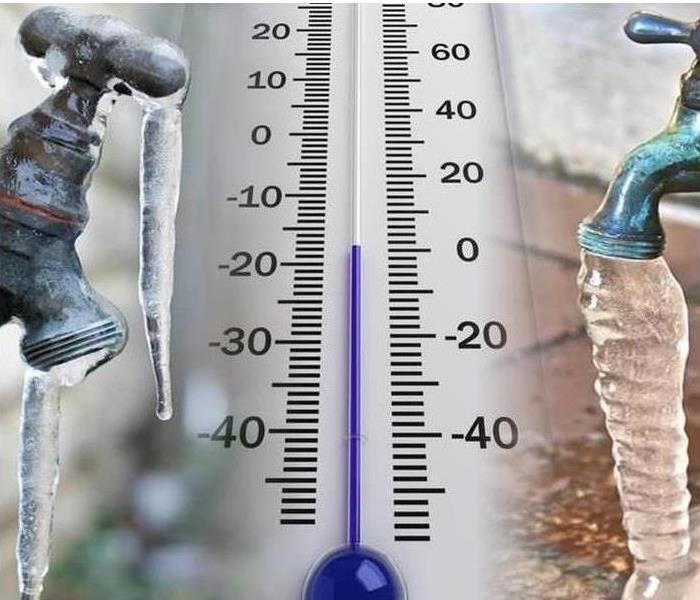 If you have already experienced a burst pipe, contact SERVPRO® of Panthersville at (678) 515-8602 to prevent structural damages and mold.
If you have already experienced a burst pipe, contact SERVPRO® of Panthersville at (678) 515-8602 to prevent structural damages and mold.
Water expands when it freezes, which is a unique characteristic. By allowing water to freeze and expand inside your pipes can lead to a tremendous buildup of pressure, which eventually causes your pipes to burst. You can save yourself from severe water damages if you learn how to avoid frozen pipes.
Preventing Frozen Pipes
Before the harsh cold of winter sets in there are a few important steps to take to reduce the possibility of frozen pipes, which include:
- Investigate your home and determine whether there are areas that are not being heated properly and are significantly colder than the rest of the home. Insulate any water pipes located in the area.
- Ensure that you drain all water from swimming pools and sprinkler supply lines.
- Close the indoor valves that supply your outdoor spigots, and then keep the outdoor spigots open and allow them to drain completely.
- Keep the garage door closed if any water pipes are in your garage.
- If the temperatures outside plummets below freezing, then always let water drip from your faucets. By keeping a small amount of water moving through your pipes significantly reduces the possibility of freezing.
- Never allow the temperature in your house to plunge below 55 degrees.
Thawing Frozen Pipes
If you are only getting a small dribble of water from your faucet, then chances are you are experiencing a frozen pipe. Here are some simple ways to thaw your frozen pipe before it bursts:
- Heat the pipe using a portable space heater, electric blanket, or hair drier.
- Keep the water running. As the frozen pipe begins to melt, then water will flow through the frozen area and helps melt the ice.
- If you have one frozen pipe, then you more likely have others. Check every faucet in your house and attempt to locate all the frozen pipes. If you are unable to locate the other frozen pipes, then call a licensed Plumber before they burst and cause water damage.
Tornado Warning!
6/28/2022 (Permalink)
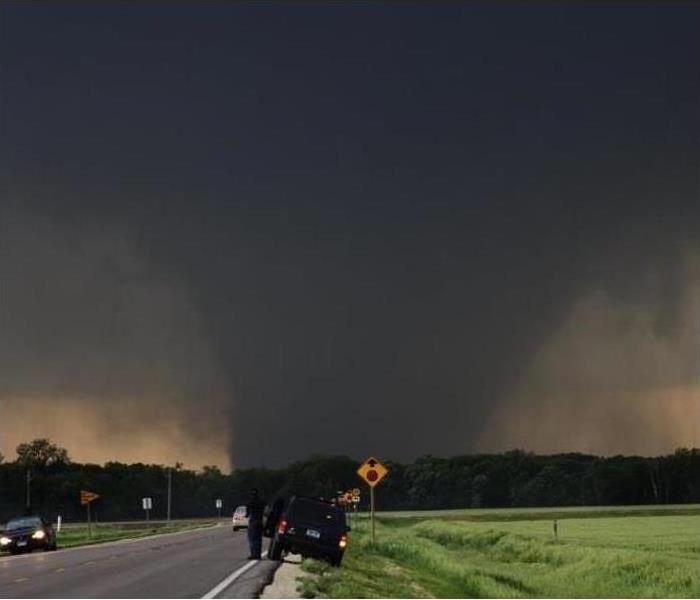 Contact SERVPRO® of Panthersville at (678) 515-8602 if you encounter tornado damages.
Contact SERVPRO® of Panthersville at (678) 515-8602 if you encounter tornado damages.
Although tornadoes can strike instantaneously, there are certain precautions and preventative measures that one can take to increase the chances of surviving tornadoes. When a warning is issued, going to a basement or an interior first-floor room of a sturdy building significantly increases the chances of survival. Many buildings have storm cellars on the properties in the areas that are prone to tornadoes.
It is often thought that opening windows will reduce the damages caused by tornadoes. Opening windows may increase the severity of the tornado's damage. A violent tornado can destroy a house whether its windows are open or closed.
Contact your Local Emergency Management Agency to learn how your community sends warnings. Some communities use sirens, others use a mass notification system, while others depend on the media to alert residents of severe storms. Ensure that you have multiple ways to receive warnings.
Tips for Winning Negotiations with Your Contractor
6/28/2022 (Permalink)
 For even more ways to save on home improvements and repairs, do not hesitate to contact SERVPRO® of Panthersville at (678) 515-8602 today.
For even more ways to save on home improvements and repairs, do not hesitate to contact SERVPRO® of Panthersville at (678) 515-8602 today.
Big home improvement projects can leave a big hole in your pocket, but you can lower your costs by negotiating the contract price and terms. If you are looking for ways to save money on home improvements, then review the following tips for winning negotiations with Contractors:
- Research—always ensure that you verify Contractors' credentials and experience before you hire them. If you are comfortable working with a Contractor with less experience and less time in the trade, then you may be able to secure a much lower price. Understandably, that there may be quality and timeframe tradeoffs. You can also research the costs of the materials needed for the project for a bargaining chip. A material cost list will help you decide whether or not the Contractor is charging higher prices for the supply portion of the project.
- Shop Around—it's hard to tell whether you are getting a great deal on your home improvement project without having anything to compare prices. Get at least three comparable bids or estimates for the project. Contractors may be willing to lower their cost or negotiate particular terms in the contract if they are competing for the work. Ensure that you provide the Contractor with as many project details as you can and read each estimate thoroughly.
- Buy Your Own Supplies—many Contractors offer to buy the supplies needed for the project and tack the cost onto the estimate or bill you for them later. Contractors often buy supplies from the same supplier, therefore, they may not be getting them at the best price. Save yourself money by offering to buy the supplies yourself to ensure that you are getting the best deals.
- Timing—the cost of your home project will depend somewhat on the season you want the work done. You might be able to save money by seeking estimates during a slow construction season when Contractors will be more willing to negotiate the costs. If you live in a cold climate and you want to add a room to your home, then consider contacting Contractors for an estimate in the winter. The work may be unable to start until warmer weather, but you may be able to lock in their winter rates.
- Approach the Contractor as an Ally—if you approach the pricing as if the Contractor is against you, then you will establish a hostile relationship. Treat Contractors as Allies and they will work with you to find the right price for your budget. Show them respect and ask for changes that may help you save money on the projects. For instance, you may be able to find less expensive countertops or a different type of flooring at a better rate.
Keep these tips in mind the next time you comparison shop for a home Contractor.
How to Prevent Mold
6/28/2022 (Permalink)
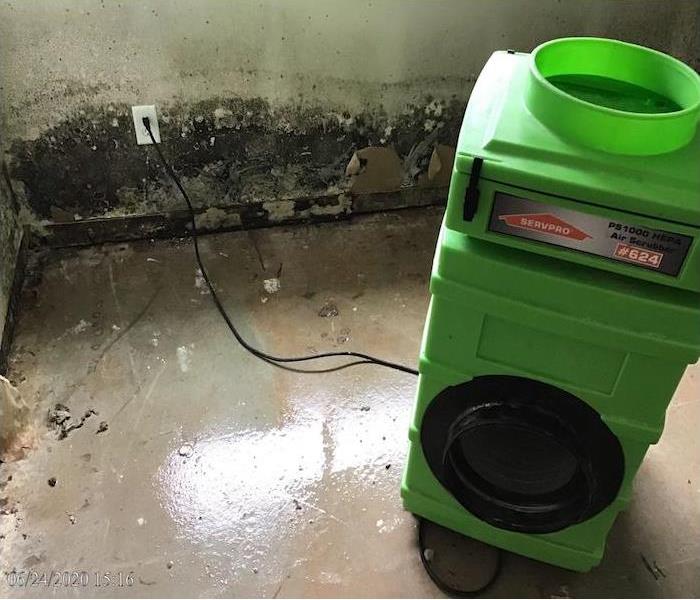 Contact the professionals at SERVPRO® of Panthersville at (678) 515-8602 who have the equipment for Mold Remediation services.
Contact the professionals at SERVPRO® of Panthersville at (678) 515-8602 who have the equipment for Mold Remediation services.
The key to preventing mold is moisture control. Mold cannot grow without excessive moisture in your home. Experts generally advise keeping the humidity levels in your home below 55%. You can use a hygrometer to monitor your humidity levels.
Give your home a thorough checkup to identify any issues that might contribute to future mold growth and correct any problems as soon as possible. Hire a professional to assist you if you are unsure how to make the necessary repairs. It will be well worth the cost because you will save so much money in health care, home repair, and mold removal expenses in the future.
- Window frames—check around all window frames to ensure that they seal tightly and no water seeps in.
- Sinks, toilets, and tubs—check under and around all sinks, toilets, and tubs for any leaking water. Install water leak sensors in these areas to alert you early to any leaks.
- Hot water heaters—check around your hot water heater for any leaking water. This is another good place to install a water leak sensor.
- Roofs—examine your ceilings for signs of a leaky roof. Sometimes you cannot see signs of leakage from inside the house until the problem worsens. Hire a professional to get up on the roof and inspect it for you if you are unsure how to inspect it.
- Bathrooms—check for adequate ventilation especially when showering. If the room gets steamy when you shower, then turn on an exhaust fan or crack open a window. If you do not have an exhaust fan in the bathroom, then you may need to install one.
- Basement—try the sniff test. Is there a musty odor in the basement? If so, there may be mold present. Purchase a dehumidifier if the basement smells damp or musty.
- Attic—also try the sniff test in the attic. There may be mold in the attic if there have been any leaks in your roof. If not, keep a hygrometer in your attic to measure humidity levels. A hygrometer transmits the humidity level to the main unit so you can monitor your attic humidity levels very easily.
In addition, you can prevent mold by:
- Wiping up any water spills promptly.
- Using a fan to help dry any damp carpet as soon as possible
- Keeping windows tightly closed when it is raining outside
- Using exhaust fans in the bathroom when showering and in the kitchen when cooking
- Wiping showers, shower curtains, tubs, and so forth dry with a towel after use
- Keeping an eye out for signs of mold and addressing any problems promptly
- Installing a solar fan in your attic so that you have good air circulation there all year round.
SERVPRO® of Panthersville Volunteers to do the Home Fire Campaign
6/24/2022 (Permalink)
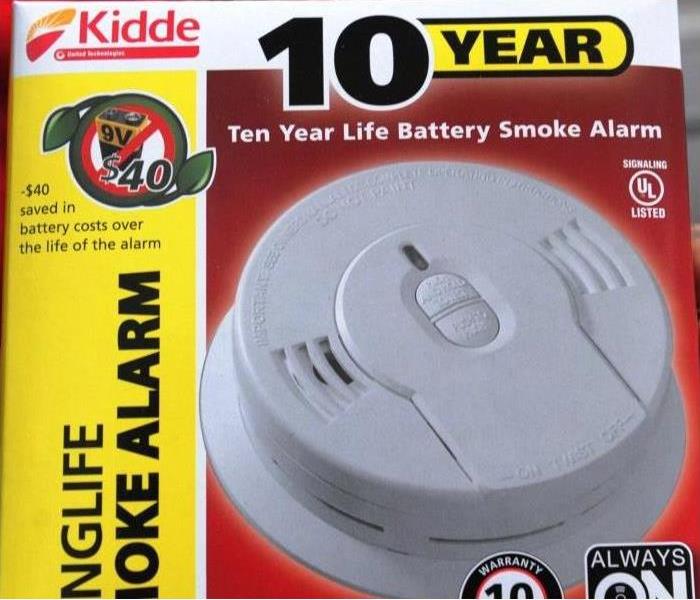 Do not hesitate to contact SERVPRO® of Panthersville at (678) 515-8602 if you have a home fire.
Do not hesitate to contact SERVPRO® of Panthersville at (678) 515-8602 if you have a home fire.
SERVPRO® of Panthersville participates as a volunteer for the American Red Cross in their Home Fire Campaign, wherein the goal is to reduce the number of fire-related deaths and injuries in the US by 25% by the year 2020. The American Red Cross responds to approximately 64,000 disasters annually in which most of them are home fires. Statistics reveals the following occurrences:
- Seven (7) people die daily from home fires wherein most of them impact children and the elderly.
- Thirty-six (36) people suffer injuries because of home fires daily.
- Over $7 billion in property damages occur annually.
Home Fire Preparedness
Household members should comply with the following instructions to be thoroughly prepared for home fires:
- Install the correct number of smoke alarms. Test them once monthly and replace the batteries at least once annually. If the American Red Cross provides the smoke alarm through its Home Fire Campaign, then it uses a lithium battery in which it will last for ten (10) years.
- Teach children the sound of smoke alarms and what they should do when they hear one.
- Ensure that all household members know two ways to escape from every room of your home and know the family meeting spot outside of your home.
- Establish a family emergency communication plan and ensure that all household members know who to contact if they cannot find each another.
- Practice to escape from your home at least twice annually. Press the smoke alarm test button or shout “Fire!“ to alert everyone in your home that they must evacuate within 2 minutes.
- Ensure that everyone knows how to call 9-1-1.
- Teach household members to STOP, DROP, and ROLL if their clothes catch on fire.
Teach Fire Safety in Your Classroom
The Pillowcase Project is a preparedness education program for grades 3 – 5, which teaches students about personal and family preparedness, local hazards, and basic coping skills. You can request the Pillowcase Project presentation from your local American Red Cross.
Volunteer to Help Others
Join your local American Red Cross to install smoke alarms, educate your community about fire safety, or help others after a fire. You can make a significant difference in people’s lives by volunteering your time and talent.
Make a Donation
Help families prevent, prepare for, respond to, and recover from home fires.
Trained Technicians who are Knowledgeable of the Mold Removal Process
6/24/2022 (Permalink)
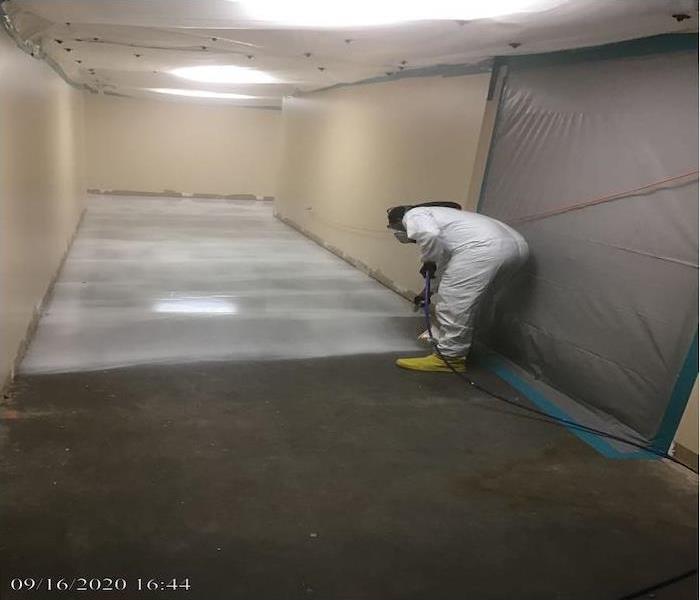 SERVPRO® of Panthersville Technicians know the encapsulation process of Mold Remediation services. Contact us at 678-515-8602.
SERVPRO® of Panthersville Technicians know the encapsulation process of Mold Remediation services. Contact us at 678-515-8602.
Mold can quickly become a problem in your home or business whenever there is a water intrusion, such as a roof leak, leaking water line, and busted pipe. Your local SERVPRO® of Panthersville has the training, protective gear, and specialized equipment necessary to handle your mold problems. Every mold damage scenario is different, which requires a unique solution. SERVPRO® of Panthersville helps satisfy the needs of insurers and property owners by providing reliable and consistent services. The following steps illustrate a “typical” mold removal process:
Call SERVPRO® of Panthersville
The mold remediation and restoration processes begin when you call SERVPRO® of Panthersville. A representative will ask a series of questions to help determine the necessary equipment and personnel needed.
Inspection
The property will be carefully inspected for signs of mold using technology designed to detect mold and hidden water sources.
Containing the Mold
Various containment procedures will be placed to prevent the spread of mold and isolate the contaminated areas with physical barriers to keep the mold spores from spreading during the cleanup process.
Air Filtration
Our Technicians use specialized filtration equipment that captures microscopic (mold that is invisible with the naked eye) mold spores out of the air. We utilize powerful air scrubbers and HEPA vacuums to prevent the spread of mold spores while the mold remediation is in progress.
Removing Mold and Mold-Infested Materials
Anti-fungal and antimicrobial treatments are also be used to eliminate mold colonies from forming. By removing and disposing of mold-infested porous materials, such as drywall and flooring may be necessary to remediate heavy mold growth.
Restoration
Restoration may involve minor repairs, such as replacing drywall, painting, and installing new carpet. It may also require major repairs such as reconstruction of various areas or rooms in a home or business.
Always Stay Safe around Electricity
6/21/2022 (Permalink)
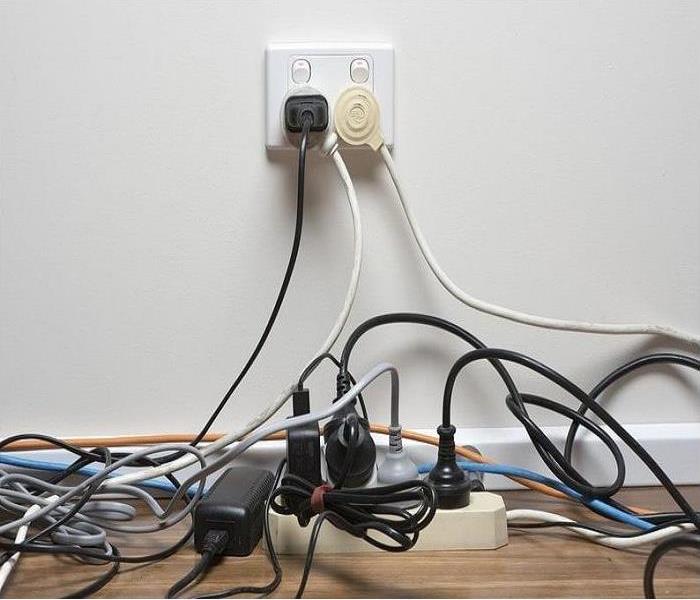 Give your home an electrical safety checkup!
Give your home an electrical safety checkup!
Summer is not only great for backyard barbecues, but it is the perfect time to finish some of those projects around your home that you have postponed all year. As you pull out the power tools and extension cords, chances are you won’t be thinking about the dangers of electricity.
Practice the following safety tips to prevent electrical injuries around your home:
- Never work with electric power tools in wet or damp conditions.
- Always look for nearby power lines before you begin to cut down any trees or trim any branches.
- Ensure that extension cords are in good conditions and that they are not overloaded. They should be used only temporarily, and they should have safety closures to help protect children from electrical shock. Never run extension cords through walls, across doorways, or under rugs or furniture.
- Unplug electrical tools and disconnect spark-plug wires on gasoline powered tools before making adjustments or clearing jams.
- Check for loose fitting plugs that can overheat and lead to fire. Never remove the ground pin to make a three-prong plug fit into a two-conductor outlet, because it could lead to electrical shock. Also, never force a plug into an outlet if it does not fit.
SERVPRO® of Panthersville Observes Black History Month
6/21/2022 (Permalink)
 The Black History Month Parade begins at the King Center National Park in Atlanta and ends at Woodruff Park.
The Black History Month Parade begins at the King Center National Park in Atlanta and ends at Woodruff Park.
Black History Month or National African American History Month is an annual celebration of achievements by Black Americans and a time for recognizing the central role of African Americans in United States history.
SERVPRO® of Panthersville participates in the local Black History Month Parade festivities, which celebrates the culture, heritage, history, and accomplishments of Black African American people across the world. The Black History Month Parade features marching bands, entertainers, dignitaries, civic groups, non-profit organizations, celebrities, corporate groups, artistic expressionists, entertainments, and fun for the whole family!
SERVPRO® of Panthersville Mentors Other Small Business Owners
6/21/2022 (Permalink)
Having a Mentor to help guide you can increase your probabilities of success. Mentors cannot make decisions for you; that is your job. But their expertise can be invaluable. Generally, they work with business owners voluntarily, that is, for the satisfaction of helping out.
SERVPRO® of Panthersville shares our professional skills with other small businesses to help them grow and create jobs. As a Mentor, we search for other entrepreneurs in the restoration business to assist online, and once connected we serve as a coach and guide. This volunteer opportunity is extremely flexible. Subsequently, we set the schedules and expectations with our Mentees.
Fire Prevention and Safety Information
6/21/2022 (Permalink)
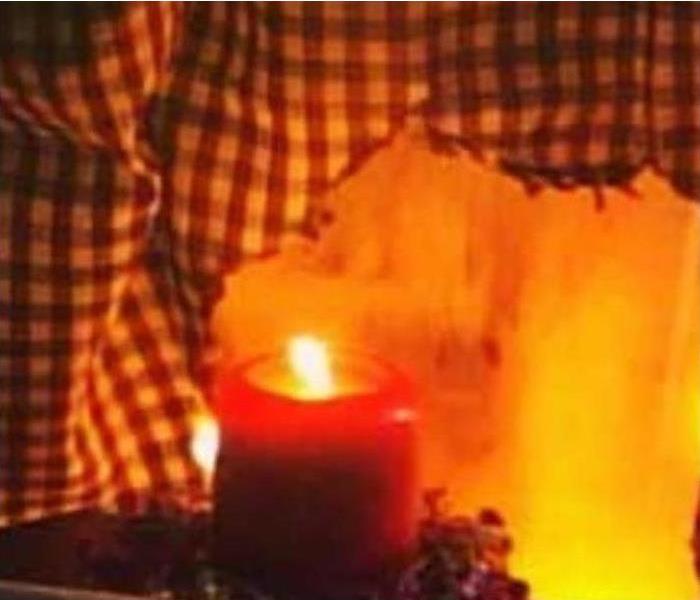 A lit candle and readily combustible materials, such as cloth, paper, and (certain) plastics are not good mixes and can lead to dire consequences.
A lit candle and readily combustible materials, such as cloth, paper, and (certain) plastics are not good mixes and can lead to dire consequences.
Kitchen Fire While Cooking
- Never use water on a grease fire! Salt or baking soda can be used to extinguish a fire. Also, smother a fire in a pan by putting a lid on it.
- Do not leave food cooking unattended.
- Pay special attention to hot grease or oil.
- Always supervise children.
- Keep a fire extinguisher nearby and ensure that it shows “A, B, or C.”
Wood, Coal, and Pellet Stoves or Fireplace Inserts
- Ensure that your stove or insert has a “UL” label on it.
- Ensure that your stove was installed properly by a contractor according to NFPA standards for proper clearances, floor covering, wall covering, flue, and chimney.
- Ensure that your chimney is cleaned regularly especially at the beginning of the season.
- Never use homemade stoves, which are a common cause of fires.
- Do not install or use stoves in a garage, because they can contact combustible materials more readily.
Candles and Potpourri Burners
- Burn candles and potpourri only when you are in the room.
- Keep open flames away from curtains and other combustible materials.
Outside Burning and Bonfires
- Do not start open fires when ground and surrounding vegetation is dry.
- Do not burn when winds are stronger than a gentle breeze.
- Always have a strong water source ready in case a fire begins to get out of control.
- Stay with the fire at all times.
- Rake through the ashes to ensure that all coals are cooled when finished.
Other Considerations
- Ensure that all outside antennas are properly grounded.
- Install lightning rods to reduce the possibility of fire by lightning strike.
- Ensure that your home’s wiring is updated and adequate to handle electrical loads.
- Do not overload circuits. Breakers trip and fuses blow when overloaded.
- If you have an older heating system, then get it checked by a professional for safety.
Lightning Safety Tips
6/20/2022 (Permalink)
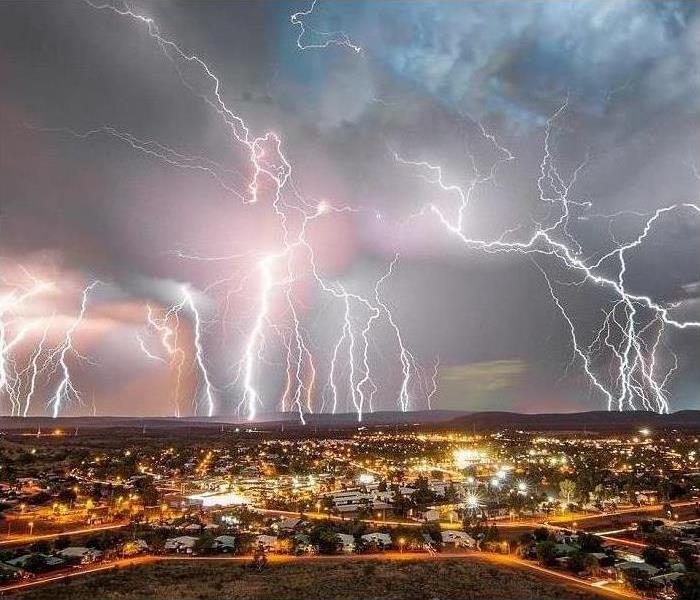 Contact SERVPRO® of Panthersville at (678) 515-8602 if you encounter a natural disaster from a lightning storm.
Contact SERVPRO® of Panthersville at (678) 515-8602 if you encounter a natural disaster from a lightning storm.
According to the National Weather Service, there are about 25 million lightning strikes in the United States each year. Comply with the following lightning safety tips when a storm occurs:
- Immediately seek shelter in a substantial building and avoid the outdoors when thunderstorms are in the area. There is no place that is safe outside during a storm. Remain in the shelter at least 30 minutes after you hear the last sound of thunder.
- If you are caught outside and cannot find shelter, then go to a low-lying open place away from trees, poles, and metal objects. Ensure that the place you choose is not subject to flooding.
- Never touch any wires that fall or low-hanging wires, because they can kill. Telephone or cable TV wires that touch a power line can also be deadly.
- Never try to make your own electrical repairs to power equipment. Let trained professionals do the work.
- Never pull tree limbs off power lines yourself.
- Never go into areas with debris or trees that fall. Dangerous power lines may be buried in wreckages.
- Never go near chain-linked fences. Dangerous lines could be touching the metal.
- Never step in puddles, because they may be electrified.
- Never connect portable generators to your household electrical wiring. Connect only essential appliances, such as freezers and refrigerators directly to a generator.
- Never walk into areas where professional Crews are working. Obey road signs and proceed cautiously if you are driving near work Crews.
Check your Smoke Alarm to Buy Time in a Home Fire
6/20/2022 (Permalink)
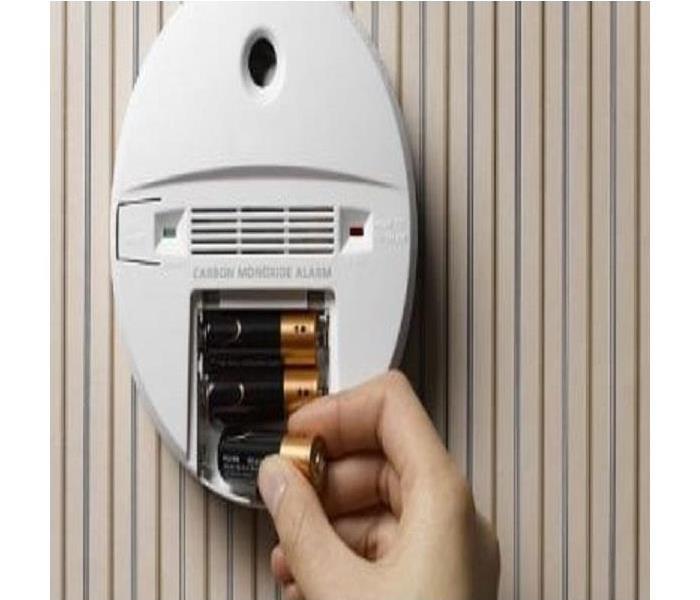 Contact our office at (678) 515-8602 for all Fire Restoration services.
Contact our office at (678) 515-8602 for all Fire Restoration services.
Spring cleaning around the house is a good time to change the batteries in your smoke alarms, especially if you forgot to change the batteries at daylight saving time. A smoke alarm is the first line of defense when it comes to surviving a home fire by giving added time to escape. You may have less than two minutes to escape a home fire.
Every home should have working smoke alarms on each level, in the hallway outside the sleeping area, and in each of the bedrooms. Never ignore the noise of the smoke alarm. A constant loud “beeping” sound from the alarm indicates smoke or fire in the home. An intermittent “chirp” indicates the battery needs to be changed.
Test the alarm monthly and replace all smoke alarms after ten years. Equally important, have an escape plan with two ways out and clear pathways to exits.
SERVPRO® of Panthersville is available 24 hours daily to perform remediation services of your home fires.
SERVPRO® of Panthersville knows every Second Counts
6/20/2022 (Permalink)
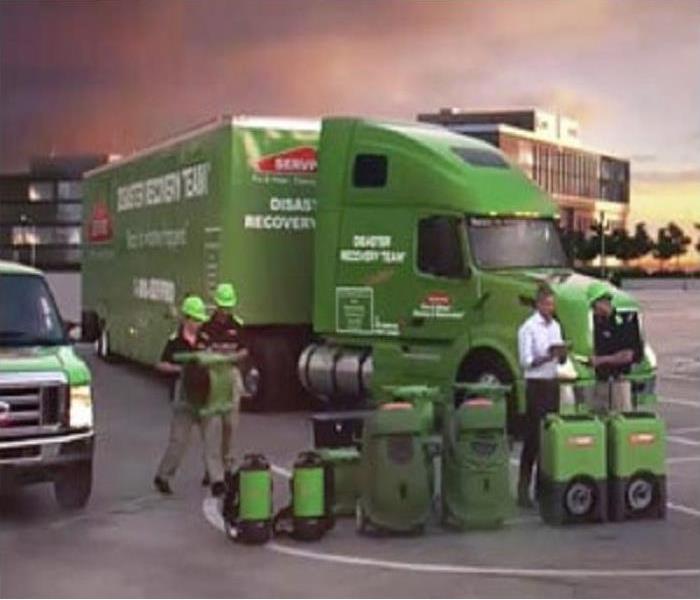 SERVPRO® of Panthersville can handle any disaster no matter how big or small.
SERVPRO® of Panthersville can handle any disaster no matter how big or small.
Fire experts agree, people have approximately two minutes to escape a burning home before it is too late. Twenty six percent of families have developed and practiced a home fire plan, which is a study conducted by the American Red Cross.
During Fire Prevention months, it is time for you to review your fire escape plans. Knowing your risks of a potential fire hazard and taking actions are just a few steps in being thoroughly prepared to save your life, and to assist in saving the lives of others.
Ways to Prepare
- Draw a map of each level of your home and be sure to find two ways to get out of each room.
- Consider escape ladders for sleeping areas on the second and third floors. Only purchase collapsible escape ladders.
- Choose an outside meeting place at a safe distance in front of your home where everyone can meet once you are all out.
- Teach children how to escape on their own in case you are unable to help them.
- Practice your escape plans during the day and at nighttime.
Each smoke and fire damage situations differ, therefore, each one requires a unique solution tailored for the specific conditions. SERVPRO® of Panthersville has the equipment, expertise, and experience to restore your fire and smoke damages. We will also treat your family with respect and take your care of your property.
Do you have Questions about Fire, Smoke, or Soot Damages?
Call Us Today 678-515-8602
How to Prevent Water Damage in your Home
6/20/2022 (Permalink)
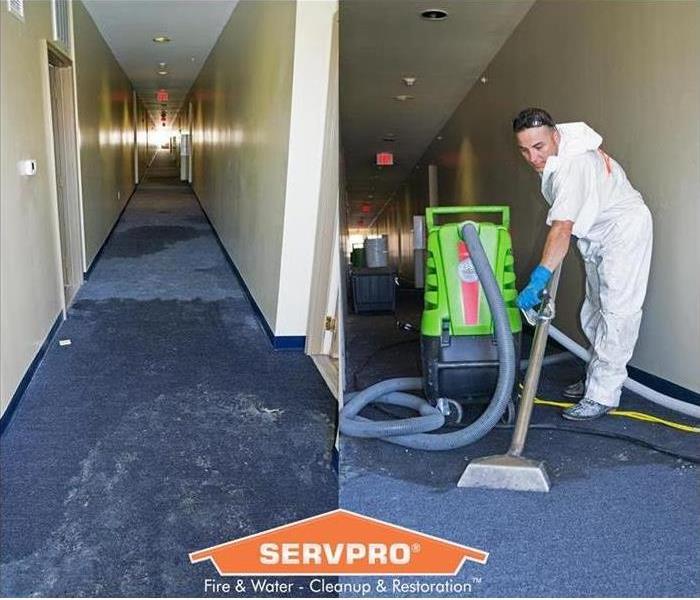 Contact SERVPRO® of Panthersville at (678) 515-8602 for professional water damage restoration services.
Contact SERVPRO® of Panthersville at (678) 515-8602 for professional water damage restoration services.
Keeping your house safe from water damage is relatively easy. Review the following list of things you can do to keep your house free of water damage.
- Clean your gutters—ensure they are free from debris that can clog and cause water damage.
- Check your downspouts—your downspouts should be directed 5 to 10 feet away from the house.
- Slope your yard—keep water flowing away from your house, not into it. Ensuring that the landscaping flows water away from the house is essential.
- Check your sump pump—you want to ensure that it is working so, at minimum, test it at least once a year. Having a backup sump pump on standby (in case the first one fails) is advisable.
- Look for leaky pipes—make repairs before a small leak turns into a big one.
- Watch where you plant—some plants and trees have invasive root systems that will compromise your drainage system, water lines, septic tank, pipes, or foundations.
- Ceiling and attic check—ensure that you do not see any wet spots on the ceiling and attic above, because they will eventually spread below.
- Repair old, tired caulking—check doors and windows along with bathtub and sink fixtures to ensure that your caulking is not cracked.
- Water bill anomalies—double check your water bill. If it has skyrocketed for no apparent reason, then it may be due to a leak.
- Inspect the roof—look for missing or damaged shingles that can cause water to leak into your home.
- Use a drain snake, not chemicals—a clogged drain is a nuisance, but did you know chemical drain cleaners can eat away at your pipes? Try your luck with a drain snake first.
- Do not pour grease or fat down your sink—pour fat and grease into an empty can and throw it away. Your pipes will thank you.
- Inspect washing machine supply lines—check out the cold and hot water supply hoses and look for cracks and other wear and tear. It is recommended that you replace hoses every five years.
- Check the floor around your toilets, tubs, showers, and sinks—look for any soft spots or moisture. You might need a Plumber to fix any leaks.
- Check your hot water heater—schedule a plumbing inspection, look for signs of corrosion, and check your maintenance instructions. You may want to flush the tank every six months to remove sediment.
- Measure the humidity levels—do you regularly have condensation on your windows? The relative humidity in your home should range between 30 and 50 percent. A humidifier may correct sporadic humidity fluctuations, but ongoing high-humidity levels may be a sign of a more serious issue that could lead to mold and mildew that may require a professional.
Electric Safety at Home
6/10/2022 (Permalink)
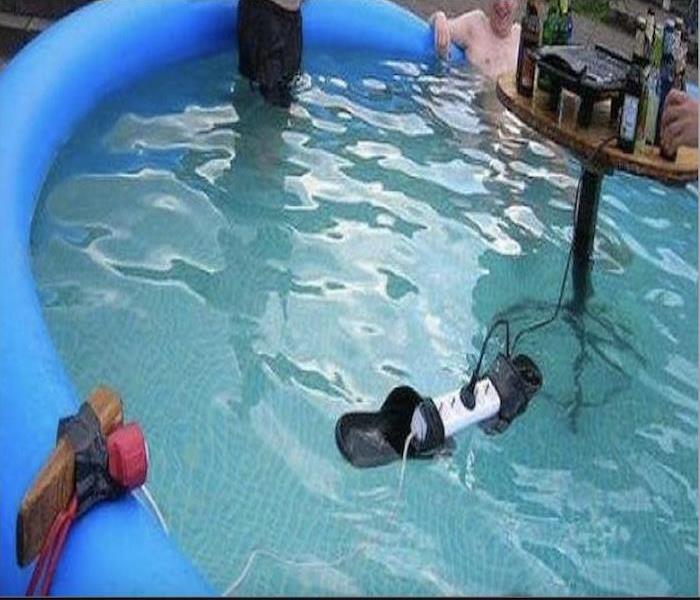 By using a power cord in a moist environment is a serious hazardous defective condition!
By using a power cord in a moist environment is a serious hazardous defective condition!
The importance of electrical safety at home is often taken for granted. Ignoring electrical safety instructions may put your safety and property at risk. Let us all do our part to contribute to a safe and accident-free environment as follows:
- Swimming Pools—do not use electrical appliances near pools; do not route extension cords in the vicinity of pools; do not raise pool maintenance or rescue poles into overhead power lines.
- Outlets—look for outlets that have loose-fitting plugs, exposed wires, or broken plates and have them fixed by a qualified Electrician. Use safety covers on all outlets accessible to children.
- Surge Protectors—only use surge protectors with internal circuit breakers. To prevent overheating, these units will trip the breaker if the power strip is overloaded or shorted to prevent overheating. Do not plug a surge protector into an existing surge protector. Unplug the unit when the surge protector is not in use.
- Cords—do not place appliance cords where they will come into contact with the stove or other heated surfaces. Do not hang appliance cords over countertops where they might be accidentally pulled down.
- Frayed Appliance Cords—worn or frayed appliance cords can cause fire, electric shock, and even electrocution. As a basic home safety procedure, inspect cords regularly to assess wear and replace cords as required.
- Boats—keep boat masts away from power lines.
- Space Heaters—read all manufacturer instructions before use, and keep heaters away from furniture, curtains, sinks, tubs, and water. Do not lay rugs or carpet over the cord. Do not use heater if the cord is frayed or broken, and do not use an extension cord. Turn off heater before leaving home or going to bed.
- Ladders—exercise caution when using ladders, painting, pruning, or cleaning near a service drop where the wiring comes into a house or building at the meter. Weatherproofing on the overhead wiring is not insulation. This covering can become brittle, cracked, and expose you to electrical contact.
- Trees—do not climb trees near power lines. Keep balloons, kites, fishing lines, and aluminum poles away from overhead lines. The lines are uninsulated and you could create a path to the ground by touching them.
- Meter Boxes—ensure safe and easy access to your meter box; do not fence in meter boxes, use private locks on meter boxes, or surround meter boxes with trees and shrubs. Keep dogs safely secured away from your meter box.
- Shoes—avoid damp or wet areas when using electrical power tools outdoors. Wear sturdy, rubber-soled shoes when working with electrical appliances outdoors. NEVER use electrical equipment when barefoot.
- Utility Poles—do not swing, climb, or run into guy wires supporting utility poles. Report damaged guy wires to the power company.
Quaternary Ammonium Compounds Antimicrobial
6/10/2022 (Permalink)
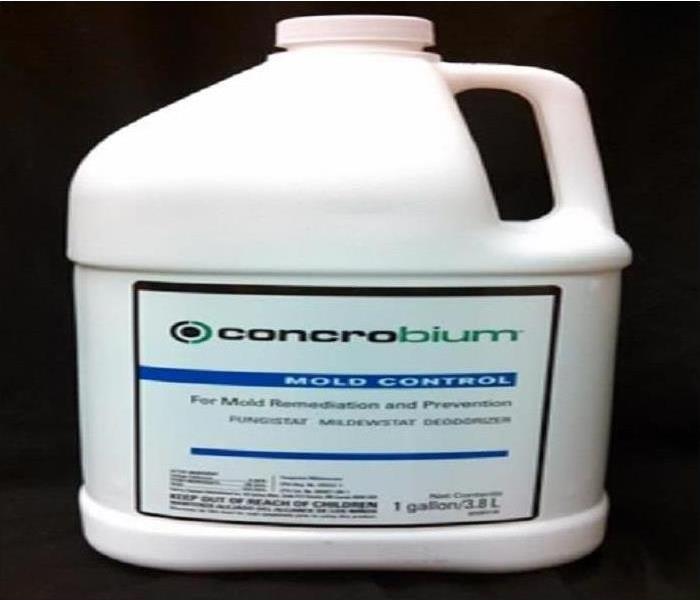 The Concrobium Mold Control antimicrobial is a highly effective cleaning product that removes mold stains quickly and easily without scrubbing.
The Concrobium Mold Control antimicrobial is a highly effective cleaning product that removes mold stains quickly and easily without scrubbing.
Routine cleaning of the environment including floors, toilet, locker room, bathing facilities, and furniture is necessary to produce conditions that inhibit the development and possible spread of infections. The advantages and disadvantages of the Quaternary Ammonium Compounds Antimicrobial are as follows:
Advantages:
- The solutions are basically inexpensive, easy to use, and widely applied in food processing areas, locker rooms, toilet, and bath areas as well as garbage storage areas.
- The product is effective against a broad spectrum of bacteria, it acts as a virucide and fungicide, and it inhibits the growth of mold and mildew.
- Some formulations of this product are used as sanitizer-cleaner solutions for cleaning and disinfecting environmental areas in one step.
- Formulations are made using this antimicrobial along with muriatic acid as a toilet bowl cleaner to remove iron and scale stains and sanitize simultaneously.
Disadvantages:
- The solutions are deactivated through contact with soaps, anionic detergents, and heavy soil accumulations.
- Antimicrobial activity is good against gram-positive organisms, but more limited against gram-negative organisms.
Know What To Do When Lightning Storms Come
6/10/2022 (Permalink)
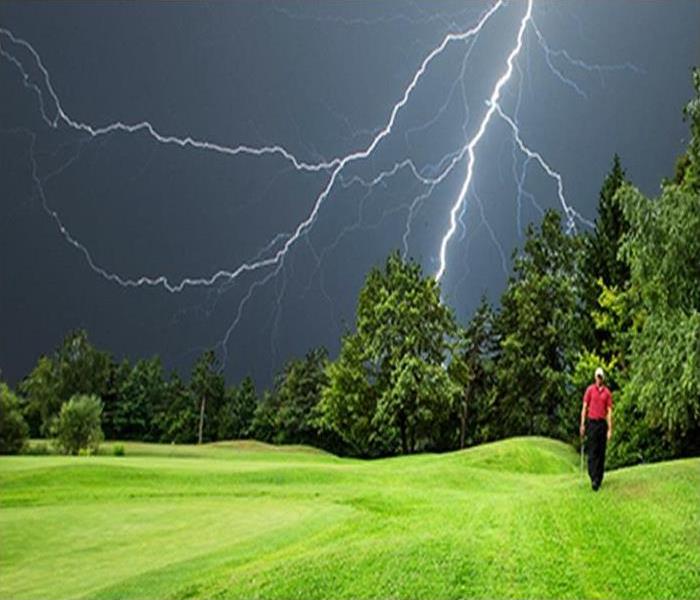 Contact SERVPRO® of Panthersville at 678-515-8602 if your property is damaged by lightning storms.
Contact SERVPRO® of Panthersville at 678-515-8602 if your property is damaged by lightning storms.
It’s hard to know what to do when you are caught out in the open during a lightning storm. To take shelter under a big tree? To stand out in the open?
The best strategy is prevention. Monitor the weather forecast before going out, and look for darkening skies, lightning, or increasing wind. You are in danger if you can hear thunder. Therefore, find shelter in either a building or car.
If you are in the open, then be a very small target! Squat low to the ground. Lying on the ground will make you a larger target. If you are in the woods, then take shelter under shorter trees or go to a low-lying, open place away from trees, poles, or metal objects. If you are boating or swimming, then get to shore and find shelter.
Call 911 if someone is struck by lightning. If the person’s breathing has stopped, then begin rescue breathing. A trained person should give CPR if the victim’s heart has stopped breathing.
Primary Damage Versus Secondary Damage
6/10/2022 (Permalink)
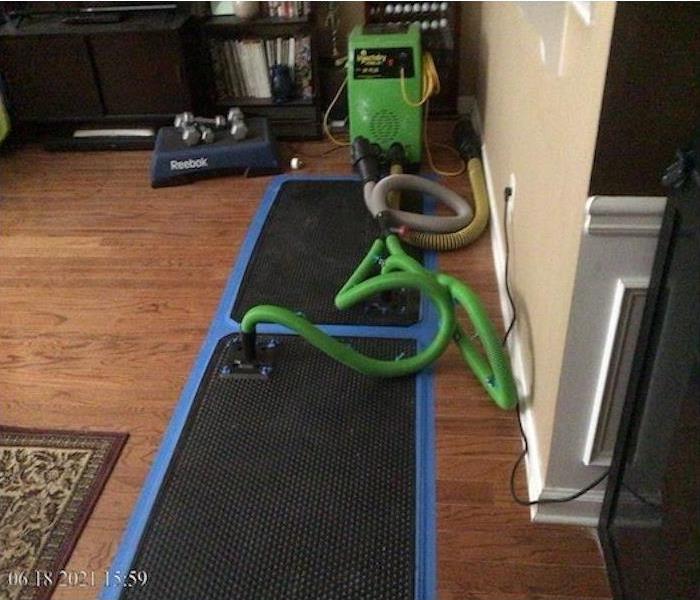 SERVPRO® of Panthersville Technicians mitigate to stop primary damages from becoming permanent and to prevent secondary damages from occurring.
SERVPRO® of Panthersville Technicians mitigate to stop primary damages from becoming permanent and to prevent secondary damages from occurring.
SERVPRO® of Panthersville Technicians are familiar with the damaging effects that water has on various types of materials. Our Technicians can identify the following three types of damages:
- Pre-existing damage
- Primary damage
- Secondary damage
Primary Damages
Primary damages in a water loss situation result when materials are in direct contact with water. Examples of primary water damages to materials are as follows:
- Delamination of carpet backings
- Swelling and buckling of hardwood floors
- Rusting of metal surfaces
- Weakening of adhesives and glues
Secondary Damages
Secondary damages in a water loss result when materials are exposed indirectly to water. When moisture evaporates into the air more quickly than moisture is being dehumidified from the air, then secondary damages can result as higher humidity slows the rate of drying. Examples of secondary water damages to materials are as follows:
- Absorption of water from the air because of high humidity.
- Absorption of water that has migrated from other areas of the structure.
- Absorption of water by hygroscopic materials that causes swelling.
- Mold growth
The damages get worse as time prolongs.
Natural Ways to Stay Healthy
5/20/2022 (Permalink)
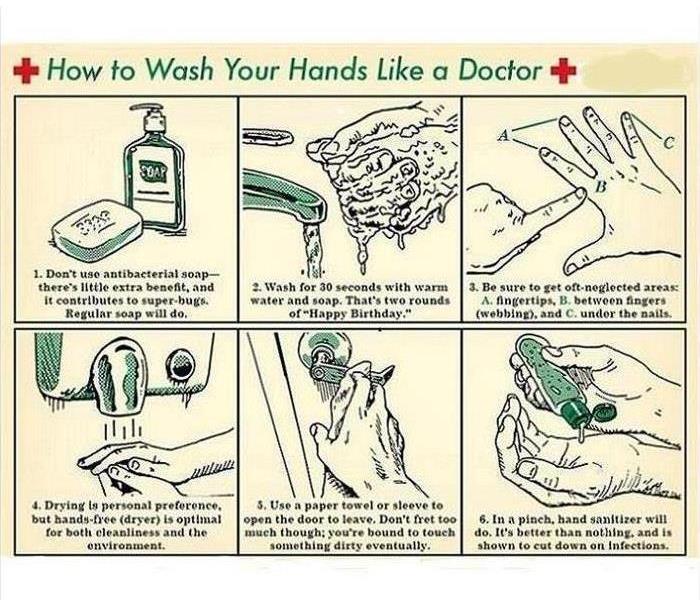 Don't forget to use antibacterial soap and wash your hands for thirty seconds like a Doctor. Hand sanitizers will also help to minimize infections.
Don't forget to use antibacterial soap and wash your hands for thirty seconds like a Doctor. Hand sanitizers will also help to minimize infections.
The cold and flu season can bring unwelcome illness into your household, but you can take some healthy steps ahead of time to be prepared. Along with getting a flu shot, by practicing good habits can lower your risk as sickness spreads through your home or workplace.
- Wash your hands—this is your best defense against the spread of viruses and bacteria. Before eating or after going to the bathroom, take about 30 seconds to work up a good lather and wash your hands thoroughly including your fingernails.
- Keep hand sanitizer nearby—you will need hand sanitizers when you are in a public place and you cannot get to a restroom. Perhaps you have shaken hands with a group of people or used public items, such as pens and shopping carts.
- Stay hydrated—keep drinking plenty of water. Dehydration can leave you vulnerable to illness.
- Eat a healthy diet—a balanced diet that includes fruits and vegetables is a good idea all year, but especially when you are exposed to illnesses. Keep sugar to a minimum; it causes your immune system to work harder. Opt for complex carbohydrates instead.
- Exercise regularly—take time to move around. Even a short walk has important health benefits.
- Get a good night’s sleep—a lack of sleep can make you prone to infection.
Types of Pollution from Water Damage
5/20/2022 (Permalink)
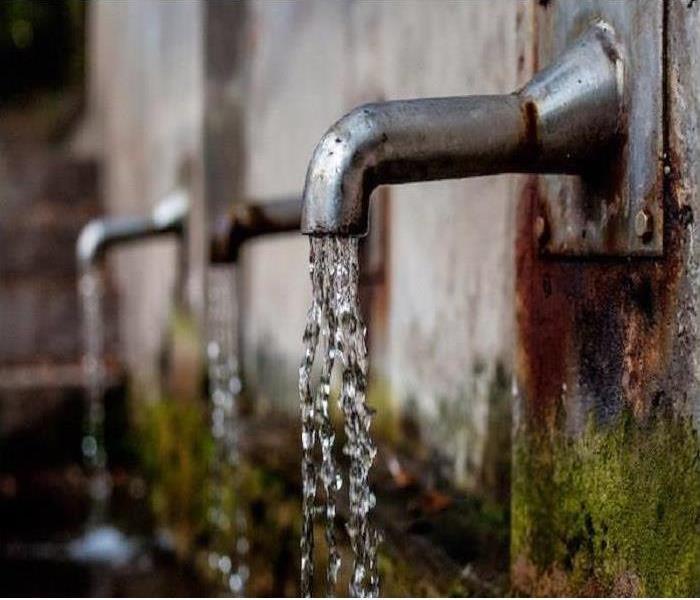 If your property has been damaged by water of any Category, SERVPRO® of Panthersville has a Team of water restoration professionals that can help!
If your property has been damaged by water of any Category, SERVPRO® of Panthersville has a Team of water restoration professionals that can help!
If you’ve ever had water damage, then you’ve likely heard terms like “black water” and “clear water” to describe the damage left behind. Though the implication is that clear water is less dangerous than black water, the reality is that there are three types that can all cause their own kinds of damage to your home or business.
Water damage can be devastating and as such we’ve outlined the three types of water contamination you might come across and their descriptions.
Classifications of Water Damage
- Category 1—the first classification, “clear water,” refers to water free from contaminants that has originated from a clean source. Normally the water will be from broken water supplies or pipes, a leak in a faucet, or rainwater direct from rainfall. Though not recommended, Category 1 water should not be harmful if consumed.
- Category 2—the next level of escalation, grey water, is a bit more serious. This classification refers to wastewater generated by appliance or drain overflows, or other types of typical household water. Because this water encounters many surfaces, Category 2 water is contaminated and can cause illness if consumed.
- Category 3—the most severe of the categories, Category 3 water is commonly known as black water. This water originates from sewage overflows, rising flood waters or water that has remained stagnant and led to breeding bacteria. Category 3 water should be regarded with extreme caution due to its high levels of contamination and can cause illness or death if consumed.
Categories Might Change
The complications of water damage can become even more complicated because water that starts as one category can easily advance to another. Water that touches contaminated surfaces or soil will develop higher pollution levels and standing water can breed harmful bacteria.
Because this is impossible to determine from appearance alone, professional cleanup is essential to obtaining peace of mind and a properly restored property.
What should I do after a hurricane?
5/17/2022 (Permalink)
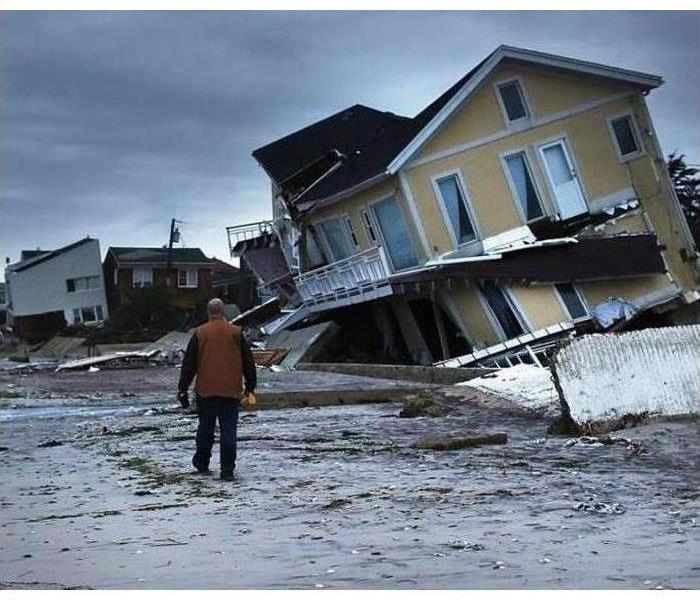 Contact SERVPRO® of Panthersville at (678) 515-8602 immediately!
Contact SERVPRO® of Panthersville at (678) 515-8602 immediately!
Hurricanes are strong storms that cause life and property threatening hazards, such as flooding, storm surge, high winds, and tornadoes. If you encounter a hurricane, ensure that you adhere to the following procedures after the storm:
- Stay alert for extended rainfall and subsequent flooding even after the hurricane or tropical storm has ended.
- If you evacuated, return home only when officials say it is safe.
- Drive only if necessary and avoid flooded roads and washed-out bridges.
- Keep away from loose or dangling power lines and report them immediately to the power company.
- Stay out of any building that has water around it.
- Inspect your home for damages. Take pictures of the damages, both of the building and its contents for insurance purposes.
- Use flashlights in the dark. Do NOT use candles.
- Avoid drinking or preparing food with tap water until you are sure it is uncontaminated.
- Check refrigerated food for spoilage. If you are in doubt, then throw it out.
- Wear protective clothing and be cautious when cleaning up to avoid injury.
- Watch animals closely and keep them under your direct control. Use the telephone only for emergency calls.
Tips to Prevent Water Pollution
5/17/2022 (Permalink)
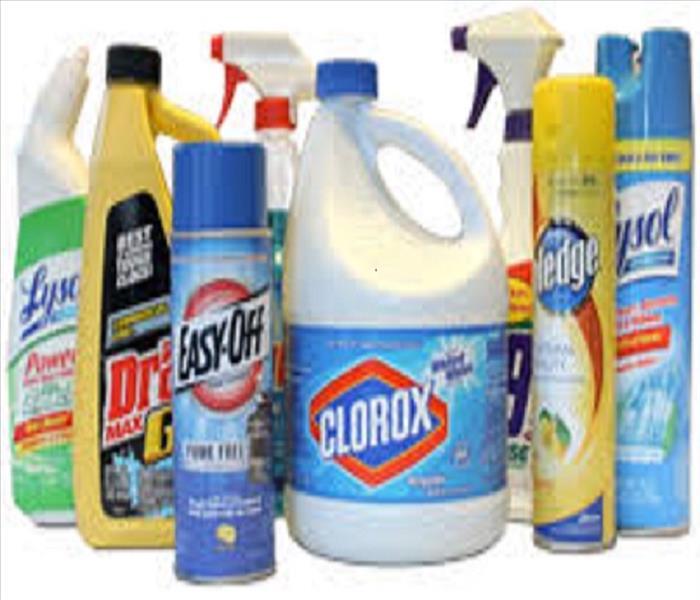 Contact SERVPRO® of Panthersville at (678) 515-8602 if your property is damaged by water pollution.
Contact SERVPRO® of Panthersville at (678) 515-8602 if your property is damaged by water pollution.
Protect the earth from home toxic waste
Many of the same chemicals that make household products effective are harmful when released into the environment. If misused or disposed of improperly, many commonly used products have the potential to become household hazardous waste.
Household hazardous waste includes paints, oils, batteries, and pesticides. Improper disposal of these types of products includes pouring them on the ground, down the drain, into a storm drain, or directly into a waterway.
Some of these items might be kept under the sink or in the garage for extended periods of time, and as their containers age, the risk of leakage increases. Once exposed to the environment, toxins could soak into the ground or be washed down a storm drain, which could lead to pollution in our lakes and streams.
Follow these tips to prevent water pollution:
- Only buy the amount you need for a project.
- Many liquid home products can be solidified using cat litter, saw dust, and other absorbent materials, and then placed in the trash.
- Many local retailers and organizations offer recycling programs, and they will accept home products for disposal.
- Consult the product label for disposal guidance.
Water Damage After Effects
5/17/2022 (Permalink)
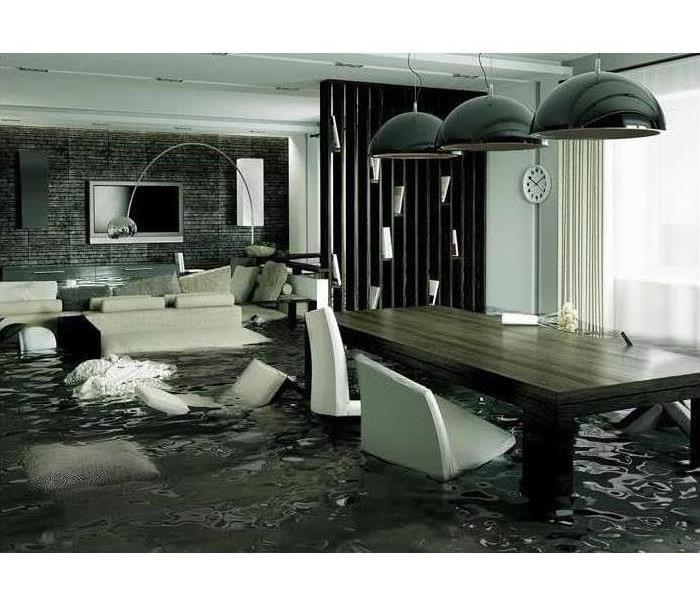 SERVPRO® of Panthersville has the equipment to thoroughly extract gallons of water if required. Contact us at 678-515-8602 today!
SERVPRO® of Panthersville has the equipment to thoroughly extract gallons of water if required. Contact us at 678-515-8602 today!
Water damage can be deceptive. Reason being, water penetrates into structural cavities creating trapped pockets of saturation. The detection of water in these areas can often only be discovered with sophisticated moisture detection meters. Undetected moisture will continue to cause damage. This damage will cause odors. Greater damages surface when materials delaminate, shrink, split, and further deteriorate to where costly repairs are required.
Besides simply removing excess water, SERVPRO® of Panthersville Production staff are IICRC-certified, and they have the knowledge and equipment to further dry a home or facility (including sub-structure materials) completely back to preloss conditions. Through timely response and the careful monitoring of water damage, mold, and other issues can be prevented. If water damage has been present too long, then mold will occur.
SERVPRO® of Panthersville professionals have the training and experience to identify moisture sources, evaluate mold growth (visible or suspected), contain damage, remove contamination, and dry materials to ensure that mold will not return.
The Process to Recover from a Fire Damage
5/13/2022 (Permalink)
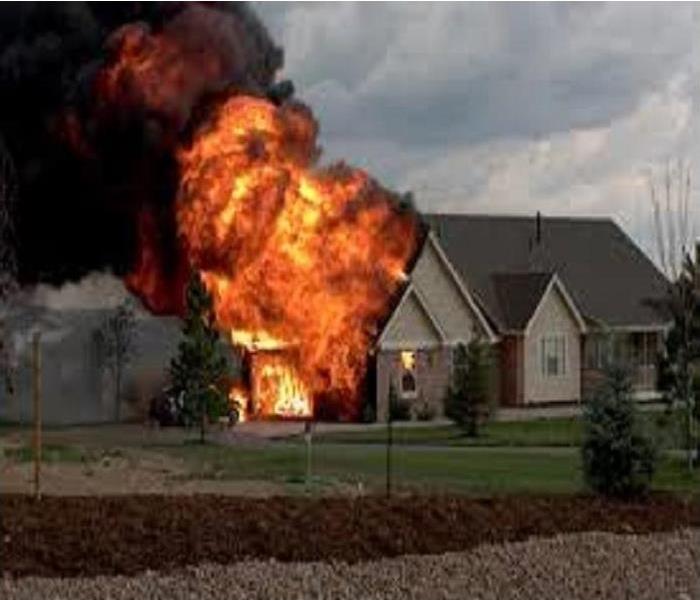 SERVPRO® of Panthersville provides full Fire Restoration services and so we can restore your property “Like it never even happened.”
SERVPRO® of Panthersville provides full Fire Restoration services and so we can restore your property “Like it never even happened.”
The fire damage restoration process begins with the removal and disposal of items that are completely unsalvageable. Anything that has been thoroughly engulfed in smoke or in contaminated water or that has been burned to pieces will likely be removed and disposed. This might involve the full removal of furniture, curtains, carpet, or fittings.
Water will meanwhile be removed from the floor early on using pumps. After this, the surfaces underneath will be dried and also the air by using a Dehumidifier.
Once water is removed and damaged items are removed, SERVPRO® of Panthersville Technicians can then begin cleaning the surfaces. This process involves removing the soot and the smoke from anything that they have touched, as well as getting rid of lasting odors. Cleaning will be performed using a variety of specialized tools and products including air-scrubbers. Our staff will also do professional carpet cleaning, which involves the use of a high-powered wet vacuum and detergent.
Once everything is cleaned, the affected area looks less like a fire has encountered the room, but more like the property has just been damaged. Thereafter, our Production staff begins to provide restoration services, such as repairing and reinstalling. If the carpet pads have absorbed contaminated water, then we may dispose them and install new ones for you. Likewise, if paint or wallpaper has come away from the walls then we reinstate them.
What should I do to Prepare for a Hurricane?
5/13/2022 (Permalink)
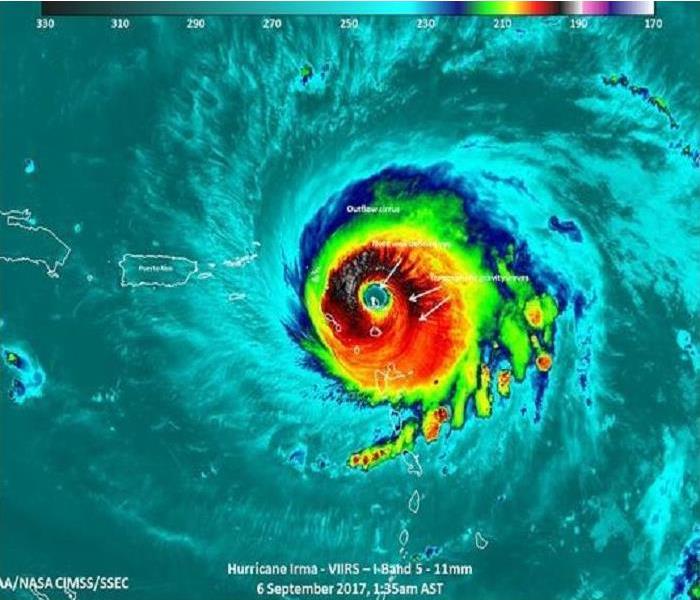 Don’t despair if you encounter storm damages from a ravaging hurricane. Contact SERVPRO® of Panthersville at 678-515-8602!
Don’t despair if you encounter storm damages from a ravaging hurricane. Contact SERVPRO® of Panthersville at 678-515-8602!
Ensure that you know the difference between hurricane watch and hurricane warning as follows:
- Hurricane Watch—hurricane conditions are a threat within 48 hours. Review your hurricane plans, keep informed, and be ready to act if a warning is issued.
- Hurricane Warning—hurricane conditions are expected within 36 hours. Complete your storm preparations and leave the area if directed to do so by authorities.
Preparation is the best protection against the dangers of a hurricane as follows:
- Check your disaster supplies and replace or restock as needed.
- Bring in anything that can be picked up by the wind, such as bicycles and lawn furniture.
- Close windows, doors, and hurricane shutters. If you do not have hurricane shutters, then close and board up all windows and doors with plywood.
- Turn the refrigerator and freezer to the coldest setting and keep them closed as much as possible so that food will last longer if the power goes out.
- Turn off propane tanks and unplug small appliances.
- Fill your car’s gas tank.
- Talk with members of your household and create an evacuation plan. Planning and practicing your evacuation plan minimizes confusion and fear during the event.
- Learn about your community’s hurricane response plan. Plan routes to local shelters, register family members with special medical needs as required, and make plans for your pets to be cared for during the hurricane.
- Evacuate if advised by authorities. Be careful to avoid flooded roads and washed out bridges.
- Standard homeowners insurance does not cover flooding, therefore, it’s important to have protection from the floods associated with hurricanes, tropical storms, heavy rains, and other conditions that impact the U.S.
Cleanup of Minor Chemical Spills
5/5/2022 (Permalink)
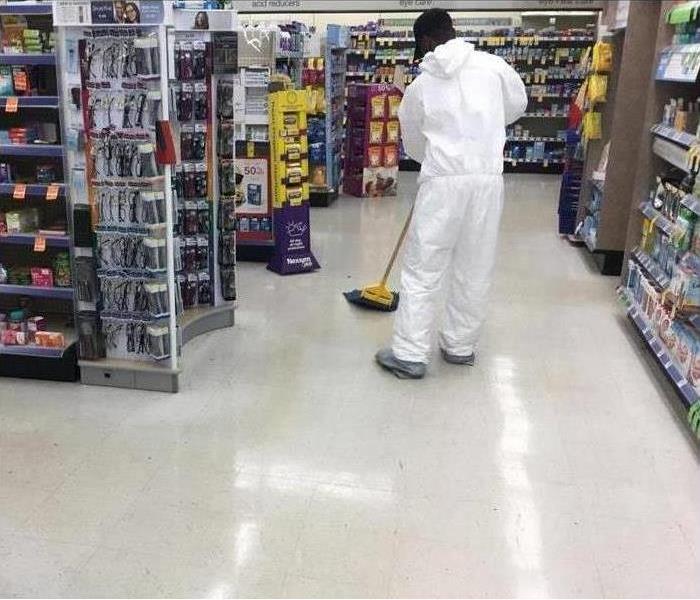 SERVPRO® of Panthersville has the expertise to provide a deeper clean than your basic house cleaning service. Call us at (678) 515-8602.
SERVPRO® of Panthersville has the expertise to provide a deeper clean than your basic house cleaning service. Call us at (678) 515-8602.
Always work carefully and do not hurry when cleaning up minor chemical spills. Keep people away from the spilled chemicals. Do not leave unless someone is there to warn of the danger. If the antimicrobial agent was spilled on anyone, then give correct first aid according to the label instructions.
Use an absorbent material to soak up the spill. You can use soil, sawdust, cat litter, or diatomaceous earth. Shovel all contaminated materials into a leak-proof container for disposal. Dispose of it as you would do with excess antimicrobial agents in accordance with federal, state, and local codes. Do not hose down the area, because it will spread the chemical.
Some spills can be neutralized to stop the chemical action. Read the labeling information to make sure that you use the correct neutralizing chemical or call the manufacturer or distributor of the antimicrobial for assistance.
Do not allow anyone to enter the affected area until the spill is all cleaned up.
Steam Cleaners and High-Pressure Washers
5/5/2022 (Permalink)
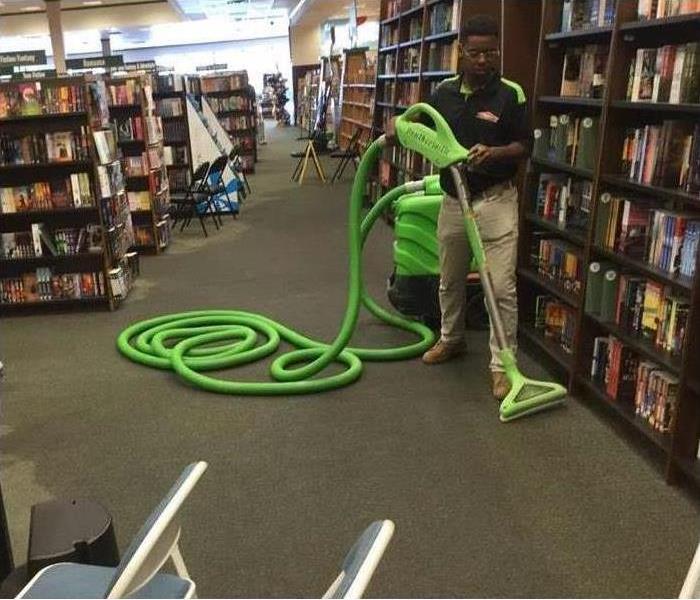 Do not hesitate to contact the trained professionals at SERVPRO® of Panthersville at (678) 515-8602 for your commercial cleaning needs.
Do not hesitate to contact the trained professionals at SERVPRO® of Panthersville at (678) 515-8602 for your commercial cleaning needs.
These machines use the advantage of heat and the force of high-pressure water to effectively dislodge and remove dirt and particulate accumulations on hard surface areas. The proper antimicrobial or disinfecting agent is proportioned into the cleaning steam to effectively reduce the bacteria count on the surfaces.
Advantages:
- Physical force of high pressure stream helps to remove contaminants so that the antimicrobial agent will be more effective.
- Large surfaces and irregular objects may be more easily cleaned and disinfected.
- The strength of the disinfectant solution may be easily varied by adjusting the individual machine’s injection rate.
Limitations:
- These machine are normally bulky and not easily transported.
- Auxiliary power source, such as gas, fuel oil, electricity, and so forth is necessary for machine operation.
- Worker requires training to successfully operate these machines.
The Technician uses a steam cleaner to clean the wet carpet in a library.
Common Causes of Electrical Fires
5/5/2022 (Permalink)
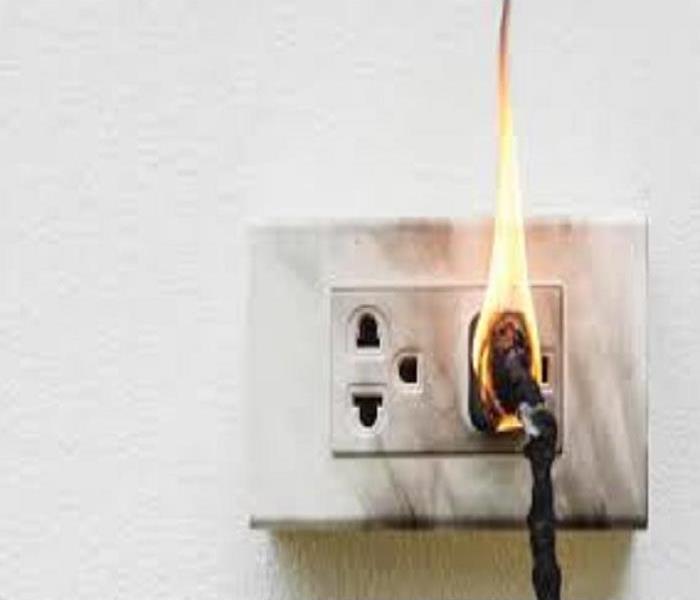 Do not panic if you need your house to be cleaned of smoke and soot that occurs from electrical fires. Call SERVPRO® of Panthersville (678) 515-8602!
Do not panic if you need your house to be cleaned of smoke and soot that occurs from electrical fires. Call SERVPRO® of Panthersville (678) 515-8602!
Here are the most common causes of electrical fires
- Faulty outlets and appliances—most electrical fires are caused by faulty electrical outlets and old, outdated appliances. Other fires are started by faults in appliance cords, receptacles, and switches. Never use an appliance with a worn or frayed cord which can send heat onto combustible surfaces like floors, curtains, and rugs that can start a fire. Running cords under rugs is another cause of electrical fires. Removing the grounding plug from a cord so it can be used in a two-prong electrical outlet can also cause a fire.
- Light fixtures—light fixtures, lamps, and light bulbs are another common reason for electrical fires. Installing a bulb with a wattage that is too high for the lamps and light fixtures is a leading cause of electrical fires. Always check the maximum recommended bulb wattage on any lighting fixture or lamp and never go over the recommended amount.
- Extension cords—misuse of extension cords is another electrical fire cause. Appliances should be plugged directly into outlet and not plugged into an extension cord for any length of time. Only use extension cords as a temporary measure. If you do not have the appropriate type of outlets for your appliances, hire an electrician to install new ones.
- Space heaters—because these types of heaters are portable, many times people put them too close to combustible surfaces such as curtains, beds, clothing, chairs, couches and rugs. Coil space heaters are especially dangerous in this regard, because the coils become so hot they will almost instantaneously ignite any nearby flammable surface. If you do use space heaters, use the radiator-type that diffuse heat over the entire surface of the appliance. These are less likely to ignite flammable items, but they should still be kept away from them.
- Wiring—outdated wiring often causes electrical fires. If a home is over 20 years old, it may not have the wiring capacity to handle the increased amounts of electrical appliances in today’s average home, such as computers, wide-screen televisions, video and gaming players, microwaves, and air conditioners. Breakers should be triggered when circuits get overloaded by too much electricity, but outdated breaker boxes often have worn connectors that do not work, which cause the system to overload and start an electrical fire.
Kitchen Fire Safety
5/4/2022 (Permalink)
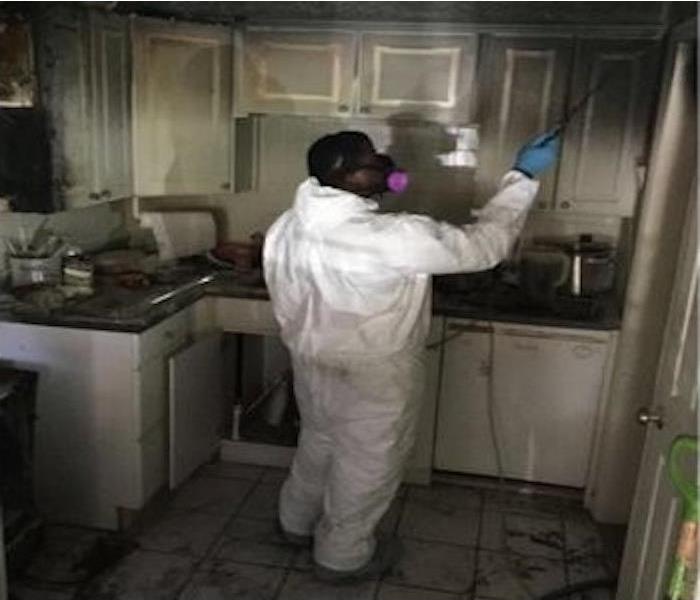 Do not hesitate to contact SERVPRO® of Panthersville at 678-515-8602 for Fire Restoration service. We are here to help!
Do not hesitate to contact SERVPRO® of Panthersville at 678-515-8602 for Fire Restoration service. We are here to help!
Cooking fires are the leading cause of fire injuries among older adults.
- Never leave your stove unattended! Always ensure that you closely watch what you are cooking.
- Keep your pot and pan handles turned inward.
- Do not reach above the stove for anything while cooking. This may require reorganizing your things in your cupboards so the items you need for cooking are not stored directly above the stove.
- Keep your curtains, oven mittens, potholders, and towels away from the stove.
- If you have an oven fire, then turn off the oven and keep the door closed.
- Keep your kitchen clean to cut down on grease buildup.
- Do not wear loose or frilly clothing while cooking.
- Never use water on a grease fire. Smother the fire with a lid or baking soda.
- Never use your stove as a heating device.
- Always turn your stove off when you are finished cooking.
Fire Escape Planning
4/28/2022 (Permalink)
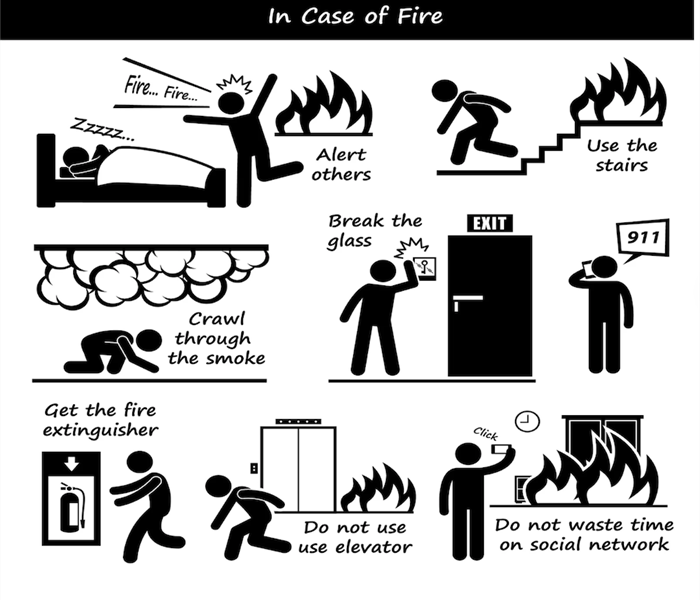 Ensure that you have a fire escape plan in case of a fire. Do not hesitate to contact us at 678-515-8602 for Fire Restoration service.
Ensure that you have a fire escape plan in case of a fire. Do not hesitate to contact us at 678-515-8602 for Fire Restoration service.
If you are still using the same escape route you used when the kids still lived at home, then it’s time for a new one!
- Sit down with all household members and discuss your escape plan.
- Plan at least two ways out of each room of your home, especially the bedrooms.
- Consider any limitations you may have that would keep you from implementing your plan.
- If any family member will need assistance, then remember to plan accordingly.
- If necessary, ensure that your exits are wheelchair or walker accessible.
- Put your plan to the test and practice it.
Extreme Weather
11/6/2021 (Permalink)
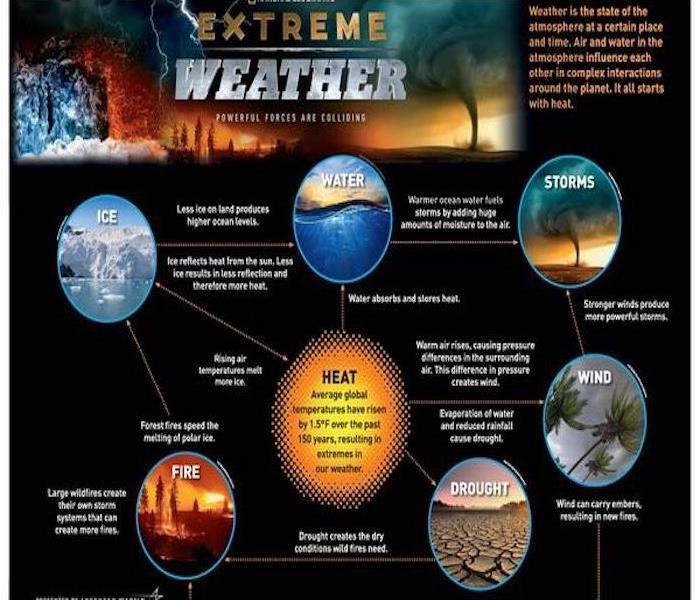 Do not hesitate to contact SERVPRO of Panthersville at (678) 515-8602 if your property encounters damages from severe weather conditions!
Do not hesitate to contact SERVPRO of Panthersville at (678) 515-8602 if your property encounters damages from severe weather conditions!
The weather is often changeable, but sometimes it is far hotter, colder, or windier than normal. Extreme weather is unusual or violent weather that can threaten lives and damage properties. Examples of the various extreme weather conditions are as follows:
- Hurricanes and typhoons are vast revolving storm systems that form over tropical oceans.
- A tornado is a rapidly spinning column of air that produces violent and destructive winds.
- Electrical storms bring thunder and lighting, strong winds, and heavy precipitation such as rain or hail.
- Blizzards are severe storms in freezing conditions, which bring heavy snowfall and very high winds.
- During an ice storm, rain freezes when it touches the ground, and coats everything in layers of ice.
- Heat waves are spells of unusually hot weather that can have adverse reactions to some people and destroy crops.
 If you have already experienced a burst pipe, contact SERVPRO® of Panthersville at (678) 515-8602 to prevent structural damages and mold.
If you have already experienced a burst pipe, contact SERVPRO® of Panthersville at (678) 515-8602 to prevent structural damages and mold.







 24/7 Emergency Service
24/7 Emergency Service




























